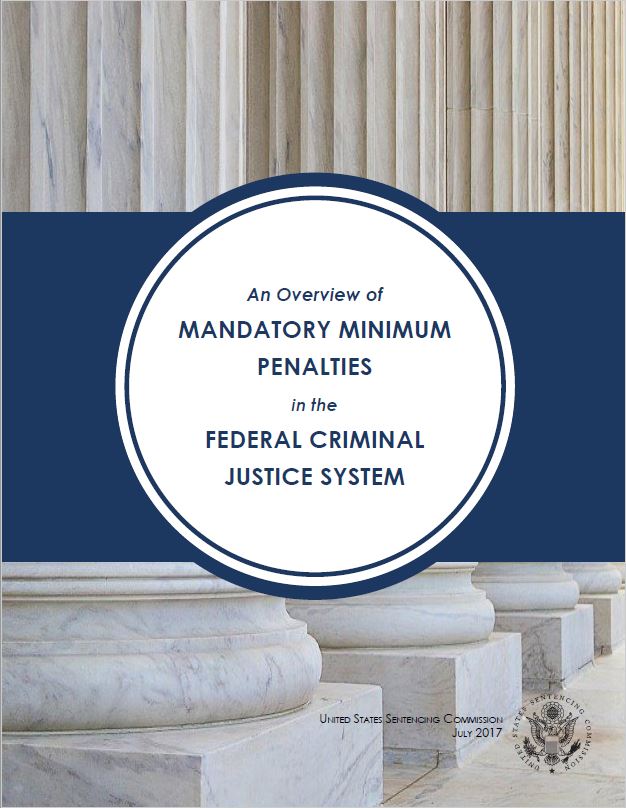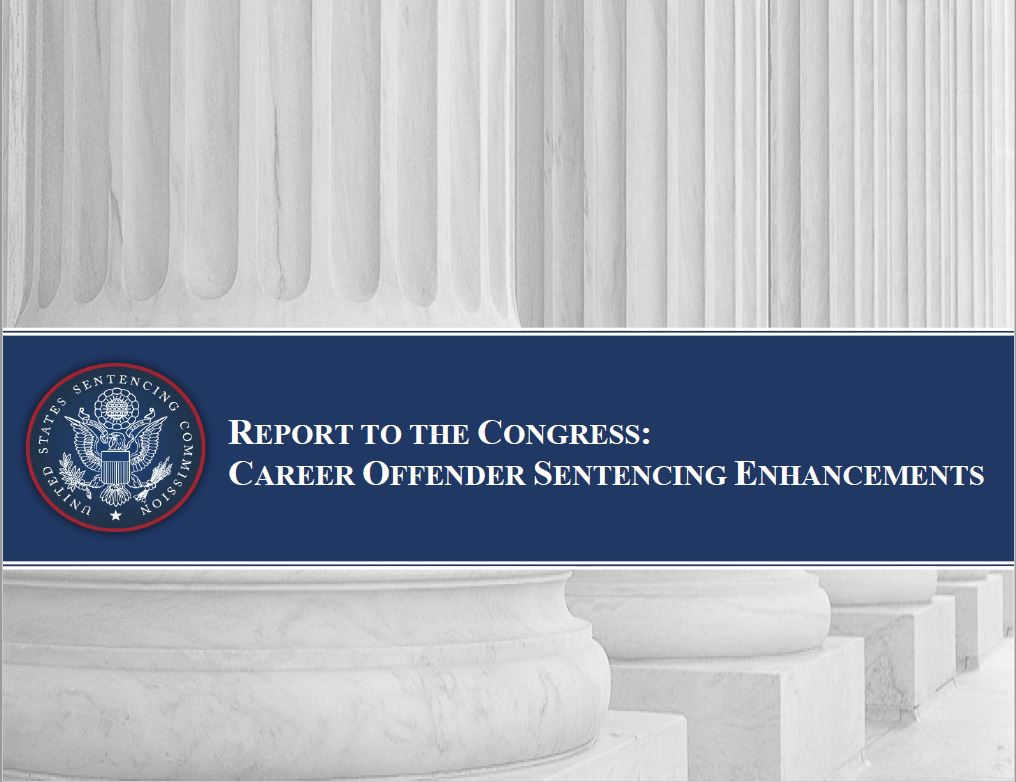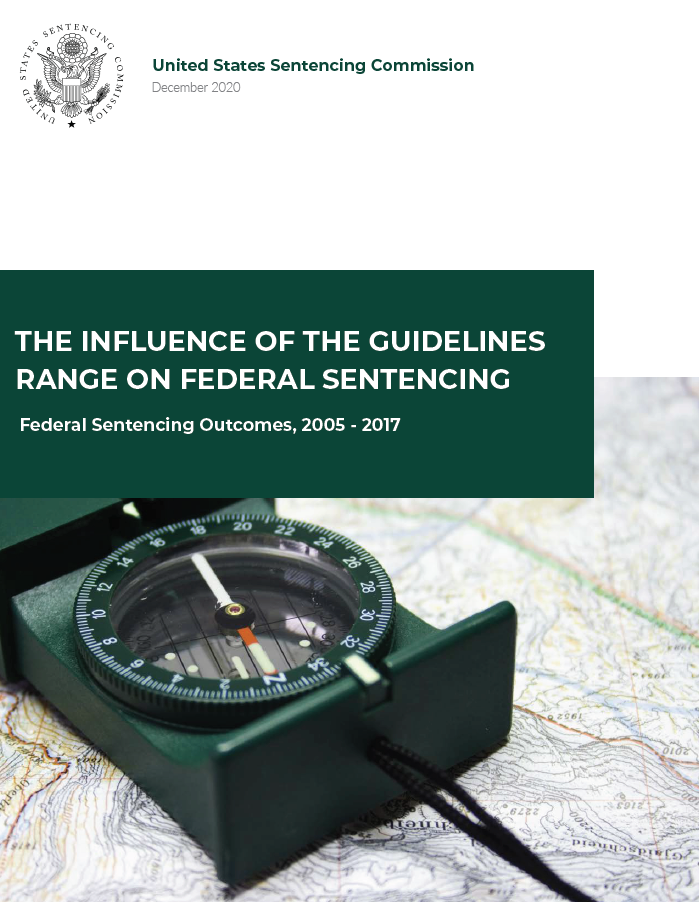Reports to the Congress
- Report on the Continuing Impact of United States v. Booker on Federal Sentencing (December 2012). This report assesses the continuing impact of United States v. Booker on the federal sentencing system. Part A of the report discusses the history of the federal sentencing guidelines and the sentencing process after Booker. It also provides statistical analyses of federal sentencing data and recommendations for strengthening the federal sentencing guidelines system. Parts B through F and corresponding appendices include more detailed descriptions of appellate court decisions, additional sentencing data, a description of other stakeholders' proposals for sentencing reform, and summaries of relevant public hearings and the Commission's 2010 survey of district judges.
- Report on the Impact of United States v. Booker on Federal Sentencing (March 2006). This report assesses the impact of United States v. Booker on federal sentencing. Explanation of revisions to version released March 13, 2006.
Campaign Finance
- Report to the Congress: Increased Penalties for Campaign Finance Offenses and Legislative Recommendations (May 2003). This report is submitted pursuant to section 314 of the Bipartisan Campaign Reform Act of 2002, Pub. L. 107-155 (the "Act"). Section 314 required the United States Sentencing Commission (the "Commission") to promulgate a guideline "for penalties for violations of the Federal Election Campaign Act of 1971." The Commission, acting under emergency authority conferred by the Act, promulgated an amendment, effective January 25, 2003, which created an temporary guideline for campaign finance offenses. That guideline was repromulgated without change as a permanent amendment in March 2003 and, subject to congressional review, will become effective on November 1, 2003.
Career Offenders
- Report to the Congress: Career Offender Enhancements (July 2016). This report, submitted pursuant to 28 U.S.C. §§ 994 and 995, presents findings of the Commission's multi-year study of statutory and guideline definitions relating to the nature of a defendant’s prior conviction and the impact of such definitions on the relevant statutory and guideline provisions.
Compliance
- Report to the Congress Regarding 28 U.S.C. § 994(w) (August 2021). This report is submitted to Congress pursuant to 28 U.S.C. § 994(w)(3) regarding the compliance of the federal district courts with the documentation submission requirements of 28 U.S.C. § 994(w)(1).
- Report to the Congress Regarding 28 U.S.C. § 994(w) (August 2021). This report is submitted to Congress pursuant to 28 U.S.C. § 994(w)(3) regarding the compliance of the federal district courts with the documentation submission requirements of 28 U.S.C. § 994(w)(1).
- Report to the Congress Regarding 28 U.S.C. § 994(w) (July 2019). This report is submitted to Congress pursuant to 28 U.S.C. § 994(w)(3) regarding the compliance of the federal district courts with the documentation submission requirements of 28 U.S.C. § 994(w)(1).
- Report to the Congress Regarding 28 U.S.C. § 994(w) (March 2017). This report is submitted to Congress pursuant to 28 U.S.C. § 994(w)(3) regarding the compliance of the federal district courts with the documentation submission requirements of 28 U.S.C. § 994(w)(1).
- Report to the Congress Regarding 28 U.S.C. § 994(w) (June 2016). This report is submitted to Congress pursuant to 28 U.S.C. § 994(w)(3) regarding the compliance of the federal district courts with the documentation submission requirements of 28 U.S.C. § 994(w)(1).
Computer Crime
- Report to the Congress: Increased Penalties for Cyber Security Offenses (May 2003). This report is submitted pursuant to section 225(c) of the Homeland Security Act of 2002, Pub. L. 107-296.
- Report to the Congress - Adequacy of Federal Sentencing Guideline Penalties for Computer Fraud & Vandalism Offenses (June 1996). This report responds to the Antiterrorism and Effective Death Penalty Act of 1996’s directive to review the deterrent effect of existing guidelines as they apply to various computer crimes. The Commission reviewed its data of guideline convictions under the pertinent statute, conducted a search to determine whether any recidivism had occurred, developed a profile of a “typical offender,” and conducted a literature review of deterrence studies of “white collar” crime.
Corporate Crime and Fraud Topics
- Report to the Congress: Increased Penalties Under the Sarbanes Oxley Act of 2002 (January 2003). This report was submitted to Congress pursuant to section 1104(a)(3) of the Sarbanes-Oxley Act of 2002, Public Law 107-204 .
- Report to the Congress: Telemarketing Fraud Offenses - Explanation of Recent Guideline Amendments (October 1998). As directed in section 6(b) of the Telemarketing Fraud Prevention Act of 1998, Public Law 105-184) the Sentencing Commission submitted to Congress an explanation of guideline amendments promulgated for telemarketing fraud offenses, as well as additional policy recommendations for combatting these offenses.
- Report to Congress: Adequacy of Penalties for Fraud Offenses Involving Elderly Victims (March 1995). This report responds to a congressional directive to review the adequacy of victim-related guideline adjustments for fraud offenses against elderly victims. The report includes: (1) an overview of the legislative history leading to the statutory directive; (2) a discussion of the operation of the relevant sentencing guidelines and policy statements; (3) an examination of case law; (4) an empirical analysis of relevant sentencing data.
Departures
- Report to the Congress: Downward Departures from the Federal Sentencing Guidelines (October 2003). This report was submitted in response to section 401(m) of the the Prosecutorial Remedies and Other Tools to end the Exploitation of Children Today Act of 2003, Pub. L. No. 108-21.
Disaster Fraud
- Report to the Congress: Amendments to the Federal Sentencing Guidelines in Response to the Emergency Disaster Assistance Fraud Penalty Enhancement Act of 2007 (September 2008). This report responds to the directive in section 5(a) of the Emergency and Disaster Assistance Fraud Penalty Enhancement Act of 2007 (the "Disaster Fraud Act"), Pub. L. No. 110-179, 2008. The report discusses the Disaster Fraud Act, its legislative history and explains the actions taken by the Commission pursuant to the congressional directive.
Drug Topics
- Report to the Congress - Impact of the Fair Sentencing Act of 2010 (August 2015). The Fair Sentencing Act of 2010 (FSA) reduced the statutory penalties for crack cocaine offenses to produce an 18-to-1 crack-to-powder drug quantity ratio. This report assesses the impact of the FSA on the federal criminal justice system.
- Report to the Congress - Federal Cocaine Sentencing Policy (May 2007). This is the Commission's fourth report to Congress on the subject of federal cocaine sentencing policy. The report updates much of the data and information contained in previous Commission reports and provides recommendations to Congress for modifications to the statutory penalty structure for federal cocaine offenses.
- Report to the Congress: MDMA Drug Offenses, Explanation of Recent Guideline Amendments (May 2001). This report was submitted to Congress pursuant to section 3663(e) of the Ecstasy Anti-Proliferation Act of 2000, Pub. L. No. 106-310.
- Special Report to the Congress: Cocaine and Federal Sentencing Policy (April 1997). This report contains the Commission's recommendations on federal sentencing policy for cocaine offenses. Appended to this report is Vice Chairman Michael Gelacak's Concurring Opinion.
- Special Report to the Congress: Cocaine and Federal Sentencing Policy (February 1995). This report responds to a congressional directive that the Commission examine federal sentencing policy as it relates to powder and crack cocaine. The report examines pharmacology, methods of use, societal impacts, cocaine distribution and marketing, cocaine's relationship to violent crime, the legislative history of cocaine penalties, and constitutional challenges; and data related to federal drug offenses.
Mandatory Minimum Penalties
- Report to the Congress: Mandatory Minimum Penalties in the Federal Criminal Justice System (October 2011). This report assesses the impact of mandatory minimum penalties on federal sentencing, particularly in light of the Supreme Court's decision in Booker v. United States. The United States Sentencing Commission prepared this report pursuant to a congressional directive contained in section 4713 of the Matthew Shepard and James Byrd, Jr. Hate Crimes Prevention Act of 2009, Pub L. No. 111–84, and the Commission's statutory authority under 28 U.S.C. §§ 994–995.
- Special Report to the Congress: Mandatory Minimum Penalties in the Federal Criminal Justice System (August 1991). This report responds to a statutory directive that the Commission examine the compatibility of the sentencing guidelines and mandatory minimum penalties, the effect of mandatory minimums on the federal system, and congressional alternatives to mandatory minimums for directing sentencing policy.
Money Laundering Topics
- Sentencing Policy for Money Laundering Offenses, including Comments on Department of Justice Report ( September 1997). This report responds to a congressional directive to comment on the Department of Justice's report on federal prosecutorial charging and plea practices affecting money laundering offenses. ( More Money Laundering publications.)
Prison Resources
- Report to Congress: Maximum Utilization of Prisons Resources (June 1994). The Sentencing Reform Act of I984 provides that the U.S. Sentencing Commission and the Federal Bureau of Prisons shall submit to Congress a joint report concerning the maximum utilization of prison resources. This report fulfills this directive.
Sex Offense Topics
- Report to the Congress: Federal Child Pornography Offenses (December 2012). This comprehensive report examines federal sentencing policy in child pornography cases. It focuses primarily on non-production offenses under USSG §2G2.2. One chapter also analyzes production of child pornography offenses under USSG §2G2.1. This report is the result of a multi-year study by the Commission and complements and expands upon the Commission's 2009 report, The History of the Child Pornography Guidelines.
- Report to the Congress: Sex Crimes Against Children (June 1996). This report analyzes all 1994 and 1995 cases involving sexual abuse, child pornography, or the promotion of illegal sexual contact. The report responds to a congressional directive in the Sex Crimes Against Children Prevention Act of 1995. Pertinent statutory provisions are analyzed and recommendations are presented.
- Report to Congress: Adequacy of Penalties for the Intentional Exposure of Others, through Sexual Activity, to Human Immunodeficiency Virus (March 1995). In this report, the Commission considers whether revisions to the sentencing guidelines were needed to accommodate offenses involving willful exposure to HIV. The report examines (1) the operation of the guidelines given the absence of a specific federal statute punishing the intentional transmission of HIV; (2) cases sentenced in fiscal year 1993 to determine the frequency with which HIV exposure was an issue at sentencing; and (3) pertinent case law.
- Report to Congress: Analysis of Penalties for Federal Rape Cases (March 1995). This report discusses the operation of the sentencing guidelines with regard to federal rape cases, compares federal and state penalties for sexual assault, analyzes Sentencing Commission sexual abuse data, and analyzes public comment and expert opinion on pertinent issues.



